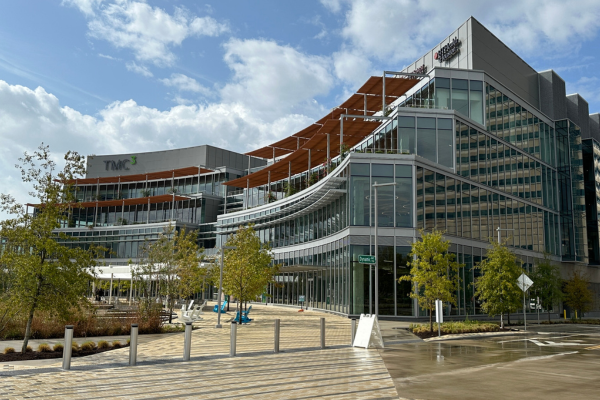TMC3 Collaborative Building Ushers New Era for Houston's Life Sciences Ecosystem
Published Oct 26, 2023 by Brina Morales
From a parking lot into a groundbreaking epicenter poised to revolutionize Houston’s life sciences ecosystem, the Texas Medical Center celebrated a monumental milestone with the grand opening of the TMC3 Collaborative Building at Helix Park.
The Texas Medical Center convened state, city and industry leaders to showcase the first phase of the 37-acre campus. The 250,000-square-foot TMC3 Collaborative Building will house research initiatives for the four founding institutions: The University of Texas MD Anderson Cancer Center, Texas A&M University Health Science Center, the University of Texas Health Science Center at Houston and TMC.
The collaborative space is located at the heart of Helix Park and aims to serve as a new hub of innovation, bringing together academic institutions, industry partners and researchers. It also includes access to wet laboratories and office/co-working space.
“The opening of the TMC3 Collaborative Building represents yet another pivotal moment in the evolution of the greater Houston region's life sciences and biotechnology ecosystem,” Partnership President and CEO Bob Harvey said. “The building is only the first phase of the vision to have TMC Helix Park be the catalyst for the Houston life sciences industry, bridging groundbreaking research and companies to bring life-saving therapies to market.”
The campus will also include additional research and industry buildings, a hotel, a residential tower and retail. Six public green spaces are complete and open to the public.
During Thursday’s ceremony, Mayor Sylvester Turner said the campus will serve as an “economic engine” for the region and the state as it attracts top talent and companies from around the world. Turner also highlighted how a new Tax Increment Reinvestment Zone (TIRZ) for the TMC and Hermann Park area will generate cash for infrastructure projects.
Portal Innovations, a Chicago-based life sciences venture capital firm, announced earlier this year it was opening an office at the collaborative building to nurture and invest in early-stage biotech and medtech startups. TMC President and CEO Bill McKeon said housing this type of firm will ensure that innovations and technologies remain in Houston.
Upon completion, Helix Park is expected to add more than 26,000 jobs and generate an additional $5.4 billion in economic activity each year, according to Governor Greg Abbott.
Learn more about Houston's thriving life sciences and biotech industry.
 The Houston Report
The Houston Report



















